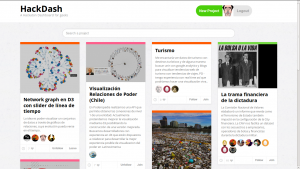
HackDash aims to become a standard for productive collaboration on innovative projects for Latin America.
The idea emerged in the midst of a whirlwind, while I was organizing the Hacks/Hackers Buenos Aires Media Party last year.
Why? When working on collaborative projects, it’s always hard to know what the other team members are doing and to keep track of databases, tasks and files. Those problems are solved by HackDash, a platform developed collaboratively by regular Hacks/Hackers Buenos Aires participants. HackDash aims to become a standard for productive collaboration on innovative projects for Latin America. As part of my ICFJ Knight International Journalism Fellowship, I’m helping encourage its adoption among media innovators worldwide.
The tool is open source and free to use. Registration is simple, and it's easy to get started: go to HackDash and organize your own hackathon, create your project and invite collaborators.
Read the rest of Blejman’s post on IJNet.
The International Journalists' Network, IJNet, keeps professional and citizen journalists up to date on the latest media innovations, online journalism resources, training opportunities and expert advice. ICFJ produces IJNet in seven languages: Arabic, Chinese, English, Persian, Portuguese, Russian and Spanish. IJNet is supported by donors including the John S. and James L. Knight Foundation.